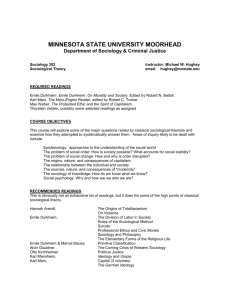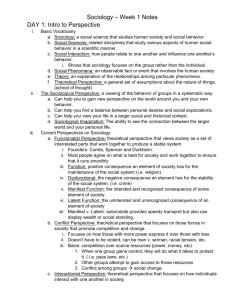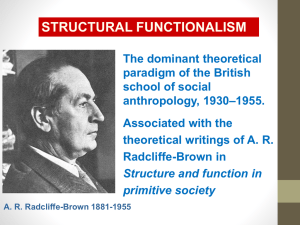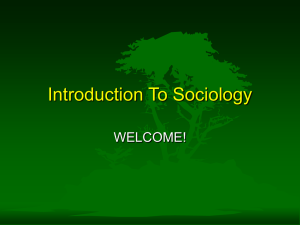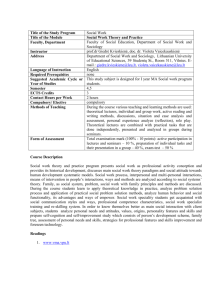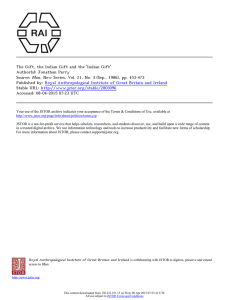Chapter 4 A VAGUE BUT SUGGESTIVE CONCEPT: THE TOTAL
advertisement
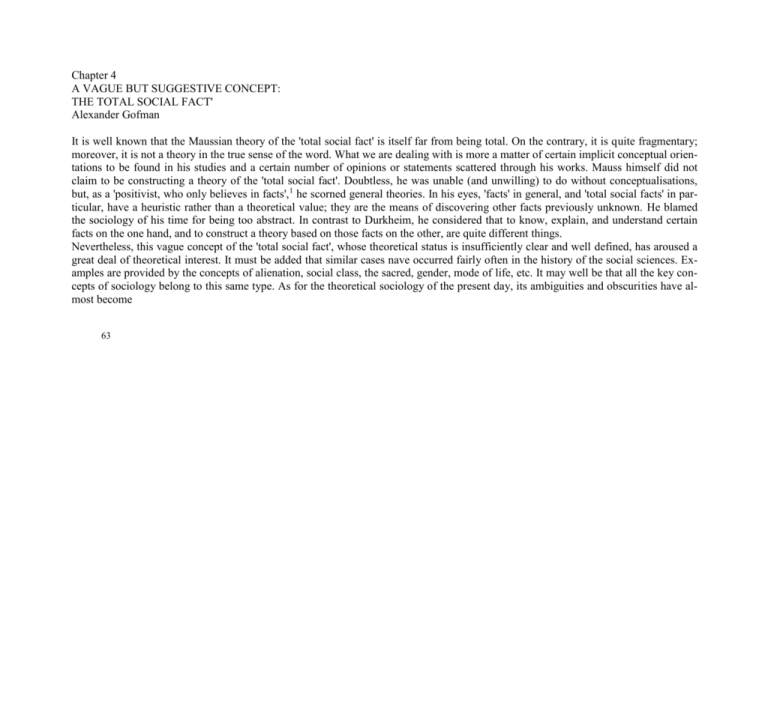
Chapter 4 A VAGUE BUT SUGGESTIVE CONCEPT: THE TOTAL SOCIAL FACT' Alexander Gofman It is well known that the Maussian theory of the 'total social fact' is itself far from being total. On the contrary, it is quite fragmentary; moreover, it is not a theory in the true sense of the word. What we are dealing with is more a matter of certain implicit conceptual orientations to be found in his studies and a certain number of opinions or statements scattered through his works. Mauss himself did not claim to be constructing a theory of the 'total social fact'. Doubtless, he was unable (and unwilling) to do without conceptualisations, but, as a 'positivist, who only believes in facts',1 he scorned general theories. In his eyes, 'facts' in general, and 'total social facts' in particular, have a heuristic rather than a theoretical value; they are the means of discovering other facts previously unknown. He blamed the sociology of his time for being too abstract. In contrast to Durkheim, he considered that to know, explain, and understand certain facts on the one hand, and to construct a theory based on those facts on the other, are quite different things. Nevertheless, this vague concept of the 'total social fact', whose theoretical status is insufficiently clear and well defined, has aroused a great deal of theoretical interest. It must be added that similar cases nave occurred fairly often in the history of the social sciences. Examples are provided by the concepts of alienation, social class, the sacred, gender, mode of life, etc. It may well be that all the key concepts of sociology belong to this same type. As for the theoretical sociology of the present day, its ambiguities and obscurities have almost become 63 64 Alexander Go/man a matter of principle and of good taste, having been carried to an extreme. One could even formulate a quasi-law whereby the more a theory or a concept is clear, well defined, and open to unequivocal interpretation, the less are its chances of success within the community of sociologists. And conversely, the more a theory or concept is ambiguous, obscure and confused, the more it is likely to dominate the sociological mind. In my view, this can be explained partly by the amount of prestige attached to the different occupations and intellectual roles in the profession of sociology. Let us, for example, imagine the appearance of a social theory which is very explanatory, clear, noncontradictory, convincing — in short, a 'beautiful' theory. What would then be left for other specialists to do? They could simply accept this theory and popularise it, or they might be obliged to confirm it with their own findings and, at most, add a little extra to it. Neither of these intellectual functions is held in very high esteem, either by the scientific community or by the public. Of course, one could also attempt to refute the theory, which would bring a little honour and glory, but this would still be in a sense a secondary kind of work and not very prestigious. So, there is not very much to say or to do where clear, exact, and convincing theories are concerned. Now let us envisage a sociological work which is fundamental and rich in ideas but incomplete; it is fragmentary in character and full of ambiguous judgements and vague concepts. In this case we, the analysts, have a wonderful opportunity for expressing ourselves, for exercising our analytical powers, in short, for putting forward our own ideas in interpreting the work. In this instance its obscurity is wholly favourable to subsequent sociologists, for they no longer have to deal with a ready-made, completed theory, but with ideas and judgements providing ample latitude for the different interpretations of the interpreters themselves. This is what we have seen, for instance, in the history of Marxist theory. We know that most of the interpretations of Marx are based on his unfinished works, on his manuscripts and letters, sometimes even on the rough drafts of these. The key concepts of Marxist theory are vague and ambiguous. Despite that, or rather because of it, a multitude of interpretations or readings of Marx are available to us today. They can be diverse or contradictory, crude or sensitive, very closely based on his texts or very far removed from them. A great number of commentaries seek to discover the 'authentic' Marx. Moreover, we are faced with many theories purporting to be Marxist or what one might call 'variations on the theme of Marx', which show scant regard for fidelity to the original texts. Thus the example of the Marxist tradition demonstrates that the incomplete and vague nature The 'total social fact' 65 of a theoretical work in sociology is one of the most effective stimulants to its subsequent development. No doubt there are many others. But, in my opinion, it is precisely this stimulus that today's 'postclassical' and 'postmodern' theoretical sociology often draws on as one of its chief means of development. It is afraid of the clear and univocal and, unlike certain classics of sociology, it attempts to be suggestive and fruitful by relying on the obscurity and ambiguity of its theoretical constructions. Let us return to Mauss and his famous concept of the 'total social fact'. In contrast with many other similar cases, the ambiguity of this concept does not derive from theoretical construction, but from theoretical nonconstruction; in other words, from Mauss's refusal to theorise. Mauss attached a great deal of importance to the concept. As far as he is concerned, and as has already been indicated, we do not have a theory of 'total' facts, but rather underlying theoretical orientations which are 'hidden' or 'dissolved' in his studies, and some judgements or slogans which arise from them. Thus, our analytical task consists in the attempt to reconstruct as adequately as possible the implicit orientations which are embodied in the Maussian concept of the 'total social fact' and which constitute the spirit or the hau of this concept, to use Mauss's favourite Maori term. Mauss's choice of this concept arose from his general fondness for the concepts of 'total' and of 'whole', as well as of 'complete' and 'concrete'. We can see this in the range of related expressions he uses, such as 'total human being', 'total prestations', the 'totality of the body of society' or the 'whole of the social system'. We can find a distant source for this fondness in the philosophical tradition going back to classical antiquity and, subsequently, in the 'universal whole' and the 'totality' of Dom Deschamps,2 and in the concepts of totality developed by Kant, Schelling, Hegel, Comte, 0. Spann, etc. It is probable that the Maussian passion for 'totality' was prompted by certain trends in the psychology of his time, trends which Mauss followed very closely. In particular, we may recall here the 'law of totality' propounded by Harald Hoffding, and the work in Gestaltpsychologie.3. The influence of the latter explains, perhaps, the somewhat unexpected appearance of the word 'form' (Gestalt in German) in the subtitle of The gift.4 Doubtless, this pursuit of the 'total' resulted from Mauss's dissatisfaction with the traditional intra- and interdisciplinary divisions which partitioned reality in an artificial way. He believed that the most significant and interesting problems in the human and social sciences were to be found on the frontiers of scientific disciplines: therefore, the 'total' vision of objects should contribute to the erosion of disciplinary boundaries. It is especially this theme which he tackles in 'Body techniques';5 his discussion there of 66 Alexander Go/man the 'cursed' category of the 'miscellaneous' which we nevertheless have to penetrate recalls the Platonic argument quoted by Henri Bergson, concerning a cook who has to cut up meat according to its natural divisions.6 This 'totalising' orientation is apparent in Mauss's general idea of the human being. It differs from the Durkheimian notion of homo duplex which considers the human being as an entity in which two forms of existence are separately present — the individual (a biopsychological organism), and the social. Mauss, in contrast, defended the idea of the 'complete' human being as a reality whose biological, psychological and socio-cultural characteristics make up an indivisible whole. He declared, 'Whether we study special facts or general facts, it is always the complete human being we are primarily dealing with.'7 From there follows the idea of the 'triple alliance' of biology, psychology, and sociology. Just as Mauss considers the study of the 'complete human being' to be the main objective of the human sciences, so he considers the study of 'total social facts' to be the supreme cognitive objective of the social sciences. In my view, a reconstruction of the implicit theoretical orientations embodied in the idea of 'total social facts' leads us to distinguish between two meanings of the expression in the works of Mauss. The first meaning lies in his constant desire to consider social phenomena as integrated objects-and-subjects, in all the fullness and complexity of their properties. In this sense, all the facts of social life which are the objects of sociology (and the social sciences in general) must be studied, ideally at least, as total facts. But, in interpreting them as totalities, Mauss does not consider them to be closed and sufficient unto themselves. The entire social system, 'the social system as a whole', is treated as an entity of the most general and fundamental kind; it is to this entity that the particular phenomenon it encompasses must be related: '...each of the special systems is only a part of the whole social system. Therefore, to describe one or other of them, without taking them all into account and especially without taking into account the supreme fact that they form a system, is to render oneself incapable of understanding them.'8 The 'total' approach to social phenomena, the interpretation of each phenomenon in close relation to the others and to the social system in which they are set, constitutes the specificity of the sociological method, making it distinct from the methods of the other social sciences.9 But Mauss's orientation towards the search for the totality of social phenomena is combined with his desire to study the mechanisms of interdependence and interpenetration of the social and the individual. He does not consider social facts as being pars pro toto (part for whole): The 'total social fact' 67 but nor is his standpoint at the opposite extreme, of totum pro parte (whole for part). This is particularly evident in his interpretation of symbols as distinctive characteristics of social facts. According to him, symbols represent social reality as well as mediating individual attitudes and orientations.10 He always studies in minute detail the particularities and details of social phenomena. The first meaning of the idea of 'total social facts' we have detected in Mauss is epistemological and methodological above all else; it consists in the tendency, as we said above, to study all social facts as total. But Mauss also considers 'total social facts' as specific ontological entities, which are sui generis (to speak in a Durkheimian vein) and distinct from other social facts. In this second sense, these total facts, as he see them, are phenomena which penetrate every aspect of the concrete social system; they concentrate it and constitute its focus, they are the constitutive elements, the generators and motors of the system: 'In certain cases they involve the totality of society and its institutions ... and in other cases only a very large number of institutions.'1' One can say that these are 'total social facts' in the true sense of the term. Each of them cuts across different institutions, values, and actions; it is at one and the same time legal, economic, religious, political, relating to production and to consumption, etc.12 The best-known and the most important example of such facts in Mauss's work is, undoubtedly, 'the gift' in archaic societies. It is obvious that the two meanings of the term that we have distinguished are very close to one another in Mauss's work, but, all the same, they are different and it is useful to distinguish between them if we wish to understand the true role of the concept in the works of its inventor. It is also obvious that the idea of 'total social facts' was in keeping with the general movement of the birth and and development of the systemic orientation in twentieth-century science. There is no doubt that in this respect Durkheim's influence on Mauss was decisive. But whereas Durkheim took as models for the social system only the biological (primarily) and mechanical systems — the organism and the machine — Mauss also had before him other epistemological patterns, namely those of psychology and linguistics, 13 where the principle of the totality of the objects of study was of paramount importance at that time. The 'total' in Mauss has many attributes or virtues; it is simultaneously the 'general', the 'universal', the 'real', the 'concrete', the 'dynamic', and so on. The attribution of all these features to the objects of study tended to bring ambiguity and even a certain mysticism into the interpretation of social phenomena. This ambiguity is seen especially in the demand that one consider all aspects 68 Alexander Go/man of social phenomena at once, simultaneously, as in the conception of total phenomena proposed by Georges Gurvitch.14 Here, the 'totalising' approach to objects of study can only be realised by means of a purely emotional or quasi-mystical process similar to the Diltheyan Erlebnis (experienced emotion).] 5 The 'total' now obviously extends beyond the limits of the kind of rational knowledge that would be open to any precise interpretation. The ambiguous and fragmentary character of the idea of 'total social facts' in Mauss gave rise to quite different interpretations of it. The best known, of course, are those of Gurvitch and of Claude LeviStrauss.16 It is very typical that these two contrasting theoreticians should have focused on the same idea. In their analyses of this idea Gurvitch and Levi-Strauss both wanted to find an intellectual precursor in Mauss. That is why their interpretations of the 'total social fact' were, to a large extent, the projections and reflections of their own points of view: the two theoreticians elaborated their own approaches using Mauss's idea of the 'total social fact' as a pretext. Despite, and perhaps thanks to, the ambiguity of Mauss's ideas, the theoretical history of the notion of the 'total social fact' is not yet over; its heuristic possibilities have not yet been exhausted. It is possibly with that notion that there began the 'return to the actor' proclaimed by Alain Touraine.17 Although he was a faithful Durkheimian, Mauss renounced the institutionalist and normative determinism of Durkheim. For the latter, as is well known, sociology was a science of the institutions which represent or embody the social system (he saw even suicide as a kind of institution). Despite the fact that in his early works Mauss was as 'institutionalist' as Durkheim (see, for example, the article he wrote with Fauconnet in 1901 18), his attention was subsequently increasingly drawn to the actions and actors who created norms, values, and social institutions. Indeed, this concept of the 'total social fact' encompasses not only the 'totality of the system', but also the 'totality of the actor', individual and collective. It is this encompassing concept that corresponds to the deeper aspirations of present-day social science, which is constantly in search of the actors, agents, subjects — in a word, of the creators of social rules and institutions. In considering social facts as total, Mauss studied societies as a specific number of persons who are linked together by different relationships and bounded by specific spatial and temporal limits. But he pursued his approach to the extent of making a principle of studying social facts as 'totalities-within-totalities'. That is why he attempted to study societies in their relations with other societies, to situate them within the framework of greater totalities. From this there followed his division of phenomena or facts into intrasocietal The 'total social fact' 69 and intersocietal; but the important thing is that, according to Mauss, intersocietal facts are also social19 He was not, therefore, assimilating the idea of society to that of the nation-state. In his studies he situated social phenomena among the phenomena of civilisation — the latter being, in his view, 'a sort of hypersocial system of social systems'. From all these orientations was born social anthropology, of which Marcel Mauss is justly considered one of the founders. For the spirit of this discipline indeed consists in the notion that the world community or, at least, a 'hypersocial system of social systems' is the most basic 'total social fact'. From what we have said, it is obvious that Mauss's ideas rank among those which are to be found at the origin of theories of globalisation. Anthony Giddens returns to Mauss's favourite themes when he emphasises that social totalities exist only within the framework of 'intersocial systems', and that while all societies may have a systematic character, at the same time they are constituted by the intersection of a great number of social systems.20 Finally, Mauss's theses remain of prime importance for today's sociology in that they see all social phenomena as falling within the sphere of the human will, of the different options open to it, and of the arbitrary choice between them. But while recognising these features of social reality, as well as the originality of each society, he did not in any sense deny the necessity for nomological judgements in sociology and did not reduce the discipline to everyday knowledge and mere common sense. In my view, in this connection one can find in his work a good warning against that current style of sociology that proclaims itself 'nonpositivist', 'nonclassical', 'postmodern', etc., and which, while quite rightly giving up the determinism and 'laws' of the Ancien Regime' in sociology, at the same time is sometimes ready to give up all the principles of social science and reduce the discipline to a solipsistic and ambiguous jumble of commonsensical cliches and confused ratiocinations of excessive abstraction, verging on the mystical and susceptible neither to interpretation, verification, nor refutation. In contrast to Durkheim, Mauss did not design a unitary theoretical edifice (or more than one of them), possessing global scope and a degree of closure. His concern was to resolve particular problems rather than to elaborate his theoretical views. That is why his views are sometimes a bit vague and fragmentary, and why, in consequence, they can be interpreted in a great variety of ways. On the other hand, his ideas were more subtle and open than those of his teacher. Like Saint-Simon, he knew how to pioneer new paths leaving to others the task of following them in whatever way they chose. It is for us to follow them and to invent others — as indeed always happens with a thinker of classic status. Alexander Go/mart 70 NOTES 1. 2. Mauss, 'Intellectual self-portrait', chapter 2, this volume. 3. H. Hoffding, Psychologic in Umrissen auf Grundlage der Erfahrung [1882], 2nd edn, Leipzig, 1893, p. 217. 4. See W. Kohler, Gestalt psychology: an introduction to new concepts in modern psychology [1929]. New York. 1959, p. 189, etc. 5. 'The notion of body techniques' [1934]. in Sociology and psychology: essays by Marcel Mauss, trans. B. Brewster, London, 1979, pp. 95-123. at pp. 97-8. 6. H. Bergson, Les deux sources de la morale et de la religion, Paris, 1932, p. 109, recalling Plato, Phaedrus 265E. 7. 'Real and practical relations between psychology and sociology' [1924], in Sociology and psychology: essays by Marcel Mauss, trans. B. Brewster, London, 1979, pp. 1-33. at p. 27. 'Fragment d'un plan de sociologie generate descriptive'[1934], in Oeuvres, vol. 3, pp. 303-58, at p. 306. 8. See E. Beaussire, Antecedents de I'hegelianisme dans la philosophic francaise: Dom Deschamps, son systeme ct son ecole, Paris, 1865. p. 47, etc. 9. 'Divisions et proportions des divisions de la sociologie', ibid., pp. 178-245 at pp. 213-6. 10. 'Real and practical relations', p. 21. 11. M. Mauss, The gift: the form and reason for exchange in archaic societies, trans. W.D. Halls. London, 1990, p. 78. 12. Ibid., pp. 5-6. 79. 13. Ibid., p. 80; 'Real and practical relations', p. 20. 14. G. Gurvitch (ed.). Traite de sociologie, vol. 1 [1958], 2nd edn, 1962, p. 27, etc. 15. See W. Dilthey, Selected writings [1910]. trans, and ed. H.P. Rickman, Cambridge. 1976, pp. 168-245, at pp. 226-8. For the significance of the German term 'Erlebnis' see Rickman's Introduction, p. 29. 16. C. Levi-Strauss, Introduction to the work of Marcel Mauss, trans. F. Baker, London.1987 [1950], pp. 25-33. 17. A.Touraine, Le retour de I'acteur, Paris, 1984. 18. M. Mauss and P. Fauconnet, 'Sociologie' [1901] in Oeuvres, vol. 3. pp. 13977. 19. 'Fragment', Oeuvres, vol. 3, p. 312. 20. A.Giddens, The constitution of society: outline of the theory of struct uration. Berkeley/Los Angeles, 1984, p. 164ff.
